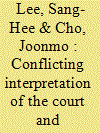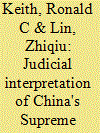| Srl | Item |
| 1 |
ID:
152269


|
|
|
|
|
| Summary/Abstract |
Due to an abrupt change in legal adjudication, Korean companies might experience a significant rise in wage costs unless preemptive policy measures reduce the legal uncertainty in a coordinated manner. The situation in Korea is compared to that of Japan, with a similar statutory structure for employee wages and allowances.
|
|
|
|
|
|
|
|
|
|
|
|
|
|
|
|
| 2 |
ID:
179776


|
|
|
|
|
| Summary/Abstract |
The literature on the allocation of power for rule-making and law enforcement assumes that administrative agencies are ex-ante regulators, while courts are ex-post enforcers. However, the Supreme People’s Court of China makes proactive rules to govern economic affairs, functioning as a de facto market regulator. The empirical evidence on Chinese credit regulations suggests that the incentive level and information access interactively determine the rule-making power allocation between courts and agencies. This article argues that the additional delegation of proactive rule-making power to the judiciary is both a challenge and an opportunity for advancing China’s reform agenda. It proposes institutional rearrangements to correct ineffective incentives and to channel information into courts. The research highlights the hybrid role the Supreme People’s Court plays in policy implementation and dispute resolution, offering new insights into the design of efficient rule-making power allocation.
|
|
|
|
|
|
|
|
|
|
|
|
|
|
|
|
| 3 |
ID:
090115


|
|
|
|
|
| Publication |
2009.
|
| Summary/Abstract |
The analysis of the profile and role of China's Supreme People's Court needs updating. The Court is actively developing new interpretative formats that concern its relations with sister organizations and the National People's Congress. This article contextualizes these formats within China's changing institutional dynamics. China does not have a separation of powers; however, the Chinese system of justice does have its own separation of functions. The Court is playing a pivotal role from within the changing separation of functions, but the extent and quality of its independence from other organizations are open to question. In the context of deepening legal reform, the law is still incomplete and imperfect, and Court interpretation has often served as "secondary law." In short, pragmatic judicial interpretations have sometimes preceded legislation by Congress. Remedy such as secondary law might be justified as absolute administrative necessity given the outstanding structural problems that characterize China's criminal justice system, but it has attracted internal criticism that argues for narrowing the function of the Court to a more tightly disciplined judicial role as well as for plugging the holes in legal process and structure by creating guiding case law and supporting the "freedom of judge's decision making."
|
|
|
|
|
|
|
|
|
|
|
|
|
|
|
|